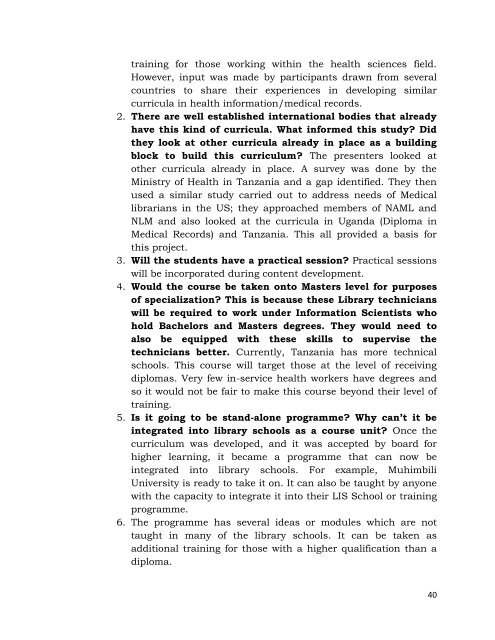REPORT OCTOBER 2016
f7u1G1
f7u1G1
Create successful ePaper yourself
Turn your PDF publications into a flip-book with our unique Google optimized e-Paper software.
training for those working within the health sciences field.<br />
However, input was made by participants drawn from several<br />
countries to share their experiences in developing similar<br />
curricula in health information/medical records.<br />
2. There are well established international bodies that already<br />
have this kind of curricula. What informed this study? Did<br />
they look at other curricula already in place as a building<br />
block to build this curriculum? The presenters looked at<br />
other curricula already in place. A survey was done by the<br />
Ministry of Health in Tanzania and a gap identified. They then<br />
used a similar study carried out to address needs of Medical<br />
librarians in the US; they approached members of NAML and<br />
NLM and also looked at the curricula in Uganda (Diploma in<br />
Medical Records) and Tanzania. This all provided a basis for<br />
this project.<br />
3. Will the students have a practical session? Practical sessions<br />
will be incorporated during content development.<br />
4. Would the course be taken onto Masters level for purposes<br />
of specialization? This is because these Library technicians<br />
will be required to work under Information Scientists who<br />
hold Bachelors and Masters degrees. They would need to<br />
also be equipped with these skills to supervise the<br />
technicians better. Currently, Tanzania has more technical<br />
schools. This course will target those at the level of receiving<br />
diplomas. Very few in-service health workers have degrees and<br />
so it would not be fair to make this course beyond their level of<br />
training.<br />
5. Is it going to be stand-alone programme? Why can’t it be<br />
integrated into library schools as a course unit? Once the<br />
curriculum was developed, and it was accepted by board for<br />
higher learning, it became a programme that can now be<br />
integrated into library schools. For example, Muhimbili<br />
University is ready to take it on. It can also be taught by anyone<br />
with the capacity to integrate it into their LIS School or training<br />
programme.<br />
6. The programme has several ideas or modules which are not<br />
taught in many of the library schools. It can be taken as<br />
additional training for those with a higher qualification than a<br />
diploma.<br />
40


